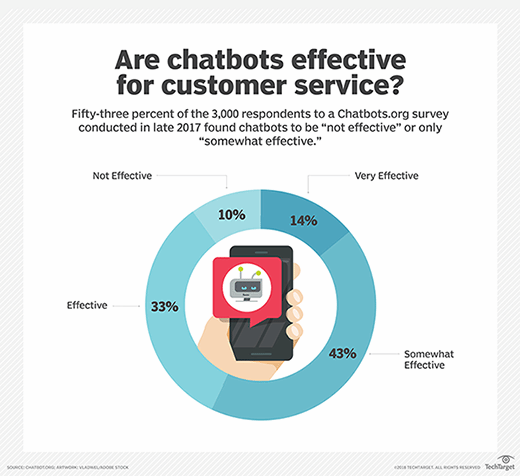Customer support chatbots set to transform service functions
AI-enabled chatbots are helping enterprises improve their customer service functions by automating some tasks, enabling human workers to focus on what really matters.
Customer experience is always a top focus for any business, and organizations today are starting to use customer support chatbots and other artificial Intelligence technologies to help improve customer service, boost customer loyalty and brand reputation, and enable employees to focus on higher value tasks that provide greater returns.
Improving agent response time and customer satisfaction
AI-enabled chatbots are increasingly being used on the front line of customer engagement. These smart bots analyze and learn customers' behaviors and interactions over time and can provide immediate responses to consumer inquiries. This helps resolve customer issues and facilitate sales.
Companies that use AI-enabled chatbots to handle and filter customer inquiries are finding that their call center and customer engagement employees are being freed from routine first-tier support requests, enabling them to handle escalated customer issues, which require more time.
AI bots are readily capable of gathering basic customer information and answering product questions or general company questions, such as the hours of operation. These bots are also learning to anticipate customers' needs by remembering conversations and using that information to deliver more custom-tailored content.

The ability to resolve issues before they arise provides significant benefit to customers. It can lower customer abandonment rates in the purchasing cycle, reduce customer complaints, and improve the overall brand image and customer loyalty.
Unlike humans, bots have the ability to work 24/7 and never suffer from fatigue. An always-on customer service agent can enable organizations to resolve issues with customers as soon as they arise. Rather than having to wait for a human agent to take action after the initial customer outreach, companies can have bots be the first line of defense, improving overall customer satisfaction and churn.
Call centers are well-known for having high turnover rates. The rush to outsource call centers has also frustrated many callers who don't appreciate agents with foreign accents or an inability to understand colloquialism. AI technologies are already being used to speak multiple languages in easily understandable voices, helping reduce caller frustration and provide faster resolution time.
Because customer support chatbots have no emotional intelligence, for better or worse, they can always use a helpful tone when dealing with customers. Companies are finding this disarming approach to be useful when dealing with disgruntled customers. Unlike humans, chatbots can keep a consistent mood, don't get flustered by a customer's tone or negative comments, and don't have personal biases that may come out in conversations.
Provide more relevant products and services
Customers often feel paralyzed by an overabundance of options when making a purchasing decision. For many product categories, there are just too many options and features to choose from. This causes some customers to stop their purchase activity. AI systems are helping by taking into account customers' personal preferences, search history, geographical location and other factors, providing customized products and service recommendations -- something that their human counterparts are not capable of.
As a result, these AI systems can provide personalized pop-ups, chat interactions or email messages that help to keep the customer engaged in the sales process and guide them to the best product offering. The success of these personalized sales assistants -- what is increasingly being called conversational commerce -- is leading many e-commerce companies to adopt AI agents as part of their sales ecosystem.
Reducing errors and increasing compliance
Human customer reps often get into trouble by bending the rules or not recording information as required by various rules, regulations, laws and company auditing requirements. Customer support chatbots, on the other hand, strictly adhere to company rules and regulations and provide an auditable trail of customer engagement for various legal requirements.
Bots have also shown they make fewer errors than their human counterparts. Machines are great at being trained, following rules, and processing and analyzing large amounts of data. AI systems have the ability to interpret customers' responses and compare them to historical data, which reduces the chances of a bot misunderstanding questions and offering incorrect solutions.
Bots also have faster response times than their human counterparts as they are not limited by typing speed, not distracted by having multiple conversations at once, and don't have knowledge gaps that require researching the issue or asking a colleague for help.
AI-enabled customer service is already making an impact in the industry. It's just a matter of time before bots become the norm for all customer-facing organizations. Perhaps we might even grow to prefer bot interactions over the less efficient and knowledgeable humankind.








